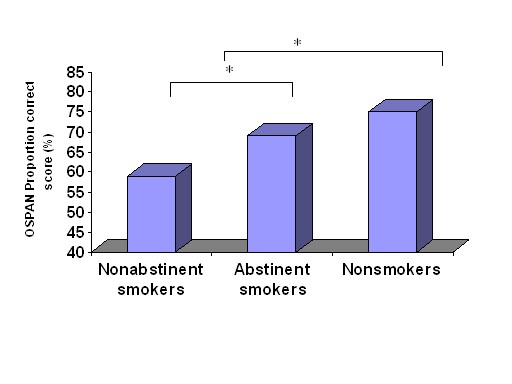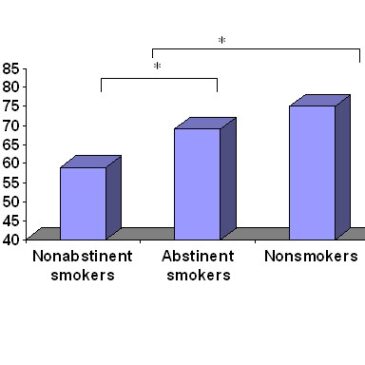Smoking can cause numerous health problems. However, despite this fact, many people start and continue to smoke cigarettes. Often, smokers argue that smoking actually helps them concentrate and think more clearly. Is it actually so? Working memory is one of the mental systems involved in the thinking process. This week the ASHES reviews a study by Greenstein & Kassel (2009), which examines the effect of smoking on working memory. Working memory is a complex mental system that is involved in performing tasks that require both storage and processing information. How does smoking and smoking abstinence affect working memory capacity? Previous studies examining this question have produced inconsistent results (e.g., showing higher or lower performance for smokers and nonsmokers on different tasks) depending on the task itself. The study under review uses highly reliable, well-validated working memory tasks to examine the effect of smoking and smoking abstinence on verbal and visiospatial working memory capacity.
Methods
- Researchers recruited 49 male middle-aged participants, 26 smokers and 23 nonsmokers.
- All participants completed two experimental sessions (1 week apart).
- During one session, smokers abstained from smoking for 12 hours or more. During the next session, investigators instructed smokers to smoke as they usually would.
- During each session, participants completed two tasks to measure their memory capacity.
- OSPAN – a measure of verbal working memory capacity.
- Participants solved a math problem while simultaneously trying to recall a series of letters.
- Investigators calculated their performance as a proportion of correct responses multiplied by 100 to get an index that ranged from 0 to 100.
- SSPAN – a measure of spatial working memory capacity.
-
- Participants recalled sequences of red-squared locations while performing a symmetry judgment task (deciding whether the presented figures were symmetrical or asymmetrical along the vertical axis).
- OSPAN – a measure of verbal working memory capacity.
- In addition, researchers measured demographic characteristics and cognitive abilities to assure the initial similarities in basic academic skills between smokers and nonsmokers (no differences were found).
Results
- Investigators removed 15 participants (9 smokers and 6 nonsmokers) from the analyses, because of low performance in math or symmetry tasks (less than 80% accuracy). This ensured that the analyses included only those participants who were attempting to solve both tasks.
- Smokers manifested better OSPAN performance (verbal working memory task) when they were abstinent compared with when they were not abstinent. Also, nonsmokers performed better on this task than did smokers (see Figure).
- There were no significant differences between any groups for the SSPN (spatial working memory task) performance.

Figure. OSPAN (Operation Span Task) performance (* p < .05). Click image to enlarge.
Limitations
- Is working memory actually the same as “concentration”? These two concepts are not necessary identical.
- The study used a limited sample size.
- Participants were males only.
Conclusion
The study claims to test the conventional wisdom that smoking helps concentration. Rather then testing concentration, however, the authors examined the more specific effects of smoking on working memory capacity. The results demonstrate that smoking might cause different effects on different working memory domains. Specifically, (a) smokers’ verbal working memory performance is less effective compared to nonsmokers’, (b) smokers’ verbal working memory capacity is less effective after smoking than during abstinence, and (c) smoking does not affect visiospatial working memory span. These results suggest that smoking actually can impair some of the memory functions necessary for complex tasks (e.g., comprehension, learning, and reasoning). The authors also interpret their results as a demonstration that there is no evidence that smoking helps the ability to concentrate. This particular conclusion, however, seems to contradict the “conventional wisdom” and other scientific results. For example, a recent study (Zabala et al. 2009) showed that smoking facilitated cognitive functioning (including attention and working memory tasks performance) among psychotic patients. The contradiction between these studies might be due to the differences between psychotic and non-psychotic participants. To test this hypothesis and to resolve the contradiction, we need additional studies.
-Julia Braverman
References
Greenstein, J., & Kassel, J. (2009). The effects of smoking and smoking abstinence on verbal and visuospatial working memory capacity. Experimental and Clinical Psychopharmacology, 17(2), 78-90.
Zabala, A., Eguiluz, J., Segarra, R., Enjuto, S., Ezcurra, J., Pinto, A., et al. (2009). Cognitive performance and cigarette smoking in first-episode psychosis. European Archives of Psychiatry and Clinical Neuroscience, 259(2), 65-71
What do you think? Please use the comment link below to provide feedback on this article.




